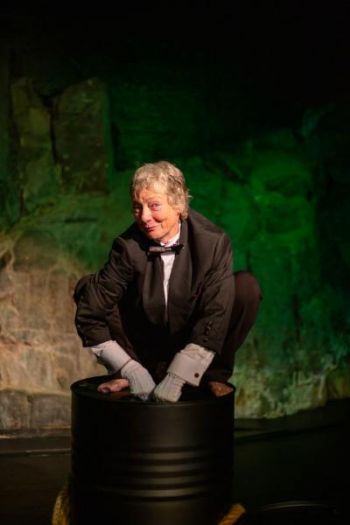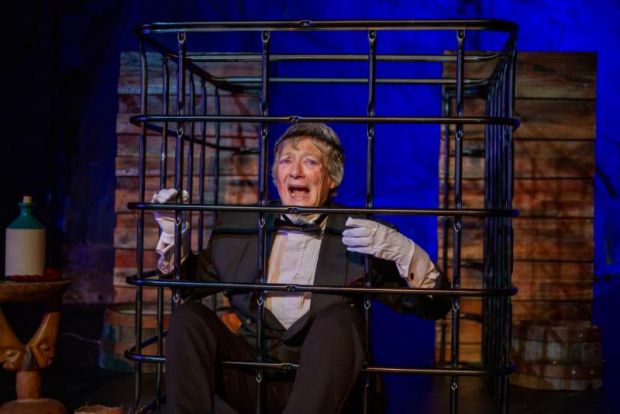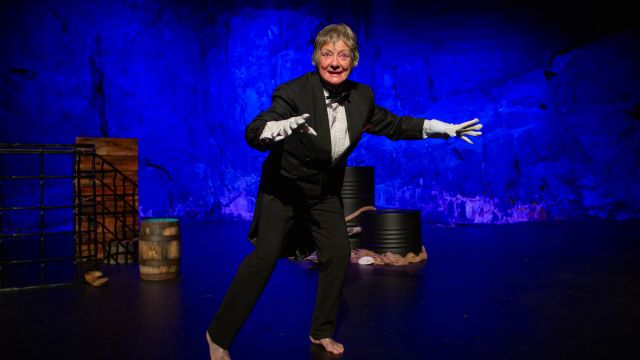Kafka’s Monkey
‘Esteemed members of the academy,’ opens the solo performer in Colin Teevan’s Kafka’s Monkey (adapted from Franz Kafka’s short story A Report to an Academy), ‘You’ve done me the great honour of inviting me to give an account of my former life … as an ape.’ So begins the peculiar story of ‘Red Peter’, an ape captured violently in Africa and brought by sea to England, where he sees ‘no way out’ but to abandon his true nature and adopt the habits of humans – a species he abhors – in order to survive his new reality. In an astonishing feat of self-directed education and training, over five years he becomes fluent in human speech and conduct, and even forgets much of his past, though he remains deeply conflicted in the role he feels forced to embrace.

Jacob Golding’s directorial debut features Penny McDonald in a quietly sure performance as Red Peter in this production for Golding Creative at Hobart’s Peacock Theatre. With sensitivity, Golding and McDonald together tackle the challenging tonal shifts between Red Peter’s cheeky, wry, knowing humour and his anguished acceptance of his lost identity; as well as the bodily shifts between the loping, acrobatic physicality of an ape and the restrained posturing of a nineteenth century gentleman. Generally these central tensions are well navigated, highlighting the thematic discomforts inherent in the portrayal of an emotionally brutal symbolic representation of the naivety of colonisation and empire.
Golding and McDonald’s work is informed by their ongoing shared practice in the Alexander Technique, and this passion and dedication translates to McDonald’s composed and confident occupation of the simple, effectively set stage. Its twin focuses are the small cage on one side, representing the cruel physical treatment of animals, and the lectern on the other, representing the more subtle cruelties intrinsic to a scientific perspective on animals. In our assumed roles as members of the academy Red Peter is addressing in his keynote speech, we are all sternly implicated in such cruelty, as he moves between his present and his past, reenacting for us some of his experience aboard the ship and his subsequent observations on humanity. McDonald seems inexhaustible in this demanding role, and brings a wide-eyed thoughtfulness to Red Peter’s journey.
In translating Kafka’s story to the stage, Teevan offers scope for the physicality of the ape to emerge ironically from the near-perfect mask of linguistic prowess that shields Red Peter on the page. The interpretation of the script could perhaps do more to tease out this juxtaposition – a paradox between humanity and the animal-other that drives both the short story and the play. McDonald’s articulate delivery is peppered with occasional ape-like grunts, twitches or wild vocalisations of pain or excitement – echoing the strange double-life this creature has found himself living – though sometimes our suspension of disbelief requires a little commitment.

Red Peter’s forced choice to educate and develop himself reminds us that we are all trapped within a cage of societal expectation (and within our own choices to forge and shape ourselves), and, more importantly, challenges us to confront our own assumptions about, and attitudes towards other species – and, by extension, other humans. His observation that ‘what I felt then, as an ape, I can only now represent in human terms, and therefore I misrepresent it’ is also a stark suggestion that Kafka’s Monkey is, too, about the costs and consequences of assimilation; about what it is to have a knowledge of self; and about the deep questions of how possible it is to ever really understand the interiority of others.
Review by Anica Boulanger-Mashberg
Anica Boulanger-Mashberg is a Hobart-based writer, editor and reviewer.
Images: Jacob Golding -GOLDINGcreative
Subscribe to our E-Newsletter, buy our latest print edition or find a Performing Arts book at Book Nook.

